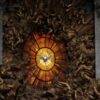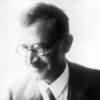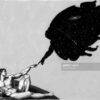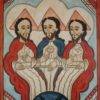Tag: Barth’s
Barth’s, “Biblical Revelation”
Portrait des Theologen Karl Barth in Basel. Photographie 1956. Portrait of the theologian Karl Barth in Basel. Photography. 1956. I was chided back in the day by some Princeton Theological Seminary, at that point, MDiv students (who now have their PhDs from the same school), by referring to Scripture as containing biblical revelation; and this with Barth’s theology as the broader background. These guys asserted that Barth would never refer to the Bible as containing “revelation” of God. And yet clearly these lads had never really even read Barth in depth. Barth’s doctrine of the Threefold Form of the Word…
Karl Barth’s Karl Marx: On the University Protests and Globalism
Economic materialism, more commonly known as Marxism is, of course, the philosophy/ideology that Karl Marx constructed; that is, to the world’s demise. It’s doubtful that Marxism is actually at play in what we are currently seeing take place at America’s Universities; that is, in regard to the recent and ongoing protests. There are clearly ideologues behind the scenes who are pulling strings in a way that might be somewhat Marxist in orientation, but I’d say that really it is just straight anarchic action with the goal of creating some type of internationalist revolution (which of course is pretty Marxist, eh)….
Barth’s Analogy of the Filioque for His Theology of the Word
Karl Barth, in his Göttingen Dogmatics, takes from neo-Reformed Dutch theologian’s, Herman Bavinck’s notion of Deus dixit (‘God has spoken’), as a way to think about the way God has revealed Himself bound up in a radical doctrine of the Word of God. Many have probably heard of Barth’s threefold form of the Word of God; it is in the early years of his time at Göttingen that this line of thinking got started for him; particularly as he was pressed upon to teach a Reformed dogmatics within a Lutheran setting. The following showcases the way Barth articulated his understanding…
Our ‘Lost Time’ in the ‘New Time’ of the Saga of Jesus Christ: How Saga Functions in Barth’s Usage
Barth is often depicted as a liberal or “neoorthodox” theologian who repudiates the inerrancy of Holy Scripture, which alone anathematizes him for the evangelical. Barth is often presented as an enemy to conservative orthodox Christianity, with his neo-Kantian, reified Hegelianism ripping to shreds any hope of giving the evangelical churches anything wholesome and genuinely biblical to cogitate upon. Barth, in many sectors of the evangelical and Reformed churches, is considered as enemy of the state to the health and well-being of historically orthodox Christianity. Barth is often demonized, caricaturized, and flambéed just at the point that someone moves their lips into…
All You Ever Wanted to Know about Barth’s Analogy of Faith
The Deus absconditus (‘hidden God’) is the Deus revelatus (‘revealed God’) in Jesus Christ. But how do we know this? Because Jesus said so; He demonstrated so. A genuine Christian theologian isn’t given to fits of speculation about godness. A genuine Christian theologian is definitionally such simply by the confession that they are Christian. But much of this has gone by the wayside in the development of dogma in the catholic Church. In Latin theology for example, where Thomas Aquinas has been canonized, for both the Catholic and Protestant theologian alike, the method for developing a doctrine of God is…
Barth’s Theology as the Confounding of His Lifestyle
As I have written previously on Barth’s unrepentant sin, with reference to his relationship with Charlotte von Kirschbaum, it is completely unacceptable. But when it comes to his theological themes, for me, those are loci that bear witness to Jesus Christ in ways that I have never seen any other theologian accomplish in the same type of way (TF Torrance is very close). His doctrine of election, as a reformulation of the classically Reformed doctrine of election, is brilliant; and it solves a gazillion problems that attend the classical Reformed and Arminian versions of the same doctrine. His anti-natural theology…
Barth’s Argument from Contingence: Creation’s Inner-Reality
In Barth’s Church Dogmatics III/1 we get into his doctrine of creation. As I was reading along, as is typical when reading Barth, I was struck with something he noted in regard to creation’s beginning; with reference to creation’s telos. Here he presents what sounds something like an argument from contingence, in regard to God’s Word as the inner ground and reality of the externally created order. Unlike the proof for God’s existence, like we often come across in philosophical or apologetic theologies—indeed, where an argument from contingence is used to argue for the universe’s non-contingent fund, namely, God—here Barth…
What is History According to Barth’s Theology?: On the Covenant of Grace
Theology ultimately should be a very concrete thing, at least for the Protestant Christian. We are people of the Word of God; we are people who have been radically brought into the life of God by a deep sense of the theology of God’s Word as that has confronted us in the face of a man from Nazareth. It is this Word-grounded reality upon which we, then, as Christians think a God-world / world-God relation; that is, through the analogy of the hypostatic union, of the Theanthropos Godman, Jesus Christ. And it is as we have come to know this…
Calvin in Barth’s Services on an ‘analogy of relation’ against Natural Theology and Her ‘Resourcers’ in scholasticism Reformed
Knowledge of God is the key, that is to the ‘secret of creation.’ If “Jesus Christ is indeed the real ground of creation,”[1] then in order to know what in fact creation is for, we must first know its Creator. But as Karl Barth underscores, in a rather Athanasian key, if Jesus is the ground of creation, and if Jesus is indeed the ‘Son of the Father,’ then to know the inner-ground, the secret of creation is first to know Jesus, to know the Son. As such, prior to knowing what and who creation is for, as the case may…
What Does Barth’s Trinitarian Actualism Mean? Against the Monad
When in the realm of Barth studies, you will often hear of ‘Barth’s actualism.’ But what in fact is actualism in Barth’s theology? And might it, once understood, offer the way out of the classical modes of thought in regard to God’s relation to the world through the decretum absolutum (‘absolute decree’)? In other words, could Barth’s actualism allow us to understand God’s ways vis-à-vis the world in such a way that God is no longer understood to be a static monad, but instead, a relational and personalist God, who indeed is constituted by his perichoretic co-inhering relations as Father,…









